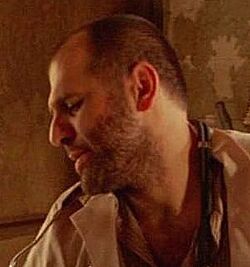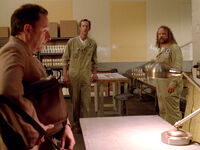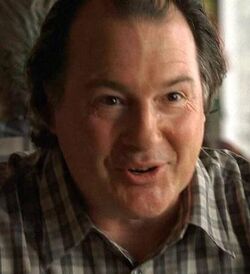
“Blood Relatives” (6 December 1996)
Writer: Chip Johannessen
Director: James Charleston
Editor: George R. Potter
Quote: “I know. I know you had to go in there. Because of who you are. Because you had no choice.” --Catherine Black

Overview: There is a standout moment in “Blood Relatives” when Frank Black, standing on the shore of a glistening lake, his thoughts dominated by the details of a hideous crime, takes a moment to slip off his iconic coat and then tosses it to the waiting Peter Watts. The dedicated viewer knows just what will happen next. Before Bob Bletcher can even cry out a protest, as he did during a similar scene in the pilot, the profiler steps forth and trudges determinedly into the water in search of the case’s next clue. He finds it nearly a dozen feet from the shore, fishing with his arm beneath the surface of the water, fingers combing submerged sand and rocks in search of a reflection. He emerges from the lake soaking wet but grasping the evidence that will lead them onward in their search for a sadistic killer.
Water is often used symbolically in film and fiction. This is especially true in Millennium, a series that used water as a central symbol or metaphor in several episodes, most notably “Seven and One.” Here--as in “Pilot” and “Kingdom Come”--it serves to clearly illustrate a trait that is intrinsic to Frank Black as a character and essential to our ongoing effort to understand the nature of his unique gift. If the meaning of the lakeside scene in “Blood Relatives” is lost on the viewer, it is reiterated just moments later as the investigators storm the halfway house that hides James Dickerson. As Bletcher, Giebelhouse, and Watts follow signs and directions and head for Dickerson’s bedroom on the second floor of the building, Frank Black dashes in an entirely different direction, moving underground, to the house’s darkened basement, where he discovers that the suspect has escaped them via a cellar window. While the Seattle police search obvious or expected terrain, above the surface, Frank Black alone dares venture below.
The very tenacity that Frank demonstrates when he is faced with the barrier of a river, lake, or other body of water is what allows him to dip beneath the murky, seemingly impenetrable surface of the human psyche. In these instances as in others, Lieutenant Bletcher is Inspector Lestrade, representative of a police force possessed of pedestrian thinking and limited imagination; Frank Black is a man of wholly unconventional thinking with the courage to match it. As an investigator, Frank possesses both the ability and willingness to venture beyond the boundaries of the safe or the anticipated, that selfless willingness to immerse himself in darkest depths in search of an answer. When Frank gives himself over to one of his gruesome visions--regardless of whether we believe those visions to be somewhat supernatural or purely intuitive--he is allowing himself to be plunged below the surface of what is known into uncertain territory as uninviting as an icy river, as dark and foreboding as any abandoned basement. From a psychological perspective, his forays into the mind of the killer are no less bold. If Frank Black’s closest friends and colleagues cannot even fathom the nature of his extraordinary gift, it is because they lack that unusual and selfless mindset that shows the hero of Millennium to be so incomparable.
Connections: Cinematically, this episode’s visions are similar to those of “Kingdom Come,” the previous installment, as this is the second episode in a row to feature a death by drowning. Connor, the episode’s jealous serial killer, has been previously profiled in Adam Chamberlain’s What the Killer Sees.
Trances in Total: 3 (0:08)
Gore Score: 6/10
Read more...
 BCnU!
BCnU!


 BCnU!
BCnU! One of the major events in my life this past year was a sad one - the death of my Uncle Skippy, who was also my godfather. I consider him and my godmother, Auntie Ellie, to be major influences in my life - she with her "Auntie Mame" joie de vivre, and he with his puckish sense of humor, darting in and out with quick little quips.
One of the major events in my life this past year was a sad one - the death of my Uncle Skippy, who was also my godfather. I consider him and my godmother, Auntie Ellie, to be major influences in my life - she with her "Auntie Mame" joie de vivre, and he with his puckish sense of humor, darting in and out with quick little quips. Like the Eleventh Incarnation of the Doctor, who'll be the focus of a deluge of posts beginning at midnight, Uncle Skippy made bowties cool.
Like the Eleventh Incarnation of the Doctor, who'll be the focus of a deluge of posts beginning at midnight, Uncle Skippy made bowties cool.






![[DSC01619.JPG]](https://blogger.googleusercontent.com/img/b/R29vZ2xl/AVvXsEgvRBtAQmNDH9Te1otzHN9tPBxV39QpNRh7jIZ6AtgPMLcvK8BlRyEVOoYzupl_mF515UlJNZyOWldfdxrn3no2WCABKdO1vChFbRECimlG95mLJ2N683pAzFj8GOXBU8tFzpGJM10ZwRg/s400/DSC01619.JPG)









































